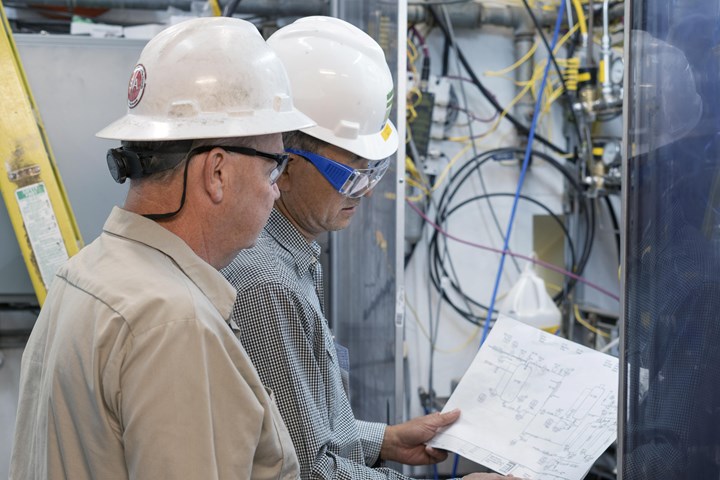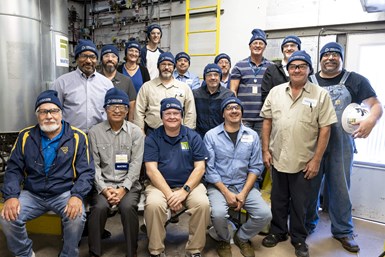Trillium awarded DOE funding for bio-based acrylonitrile demonstration plant
New award will enable Trillium and its project partners Solvay, Koch Modular and Matric to demonstrate sustainable production of acrylonitrile at scale for use in various material applications like carbon fiber.
Share
John Matheny, construction supervisor, oversees construction of pilot system in Charleston, West Virginia. Photo Credit, all images: Trillium Renewable Chemicals
Trillium Renewable Chemicals (Knoxville, Tenn., U.S.) has been selected by the Department of Energy’s (DOE’s) Advanced Manufacturing Office to receive $2.5 million to accelerate commercialization of Trillium’s process to manufacture bio-based acrylonitrile (bio-ACN), which will then be supplied to Solvay (Brussels, Belgium) to validate its use in developing sustainable, bio-carbon fiber and perform an independent ISO 9001 lifecycle analysis of Trillium’s product.
Trillium and its development partner, Matric, are currently operating a pilot plant in Charleston, West Virginia, U.S. This non-dilutive funding, in combination with Trillium’s recent Series A closing of $10.6 million — raised in a Series A financing round by investors Hyosung Advanced Materials Corp. (Seoul, South Korea), Capricorn Partners (Leuven, Belgium) Helm AG (Hamburg, Germany) — provides funding to Trillium and Matric to design, build and operate a market demonstration unit, the next step in Trillium’s commercialization plan. Koch Modular (Paramus, N.J., U.S.) will provide a front-end loading engineering design of a first commercial plant.
Acrylonitrile is a chemical intermediate typically made from petroleum-based feedstocks like propylene, and is the primary raw material used in the production of carbon fiber, acrylic fiber, acrylamide, ABS plastic, nitrile butadiene rubber and other valuable products. Trillium’s bio-ACN process delivers acrylonitrile from plant-based feedstocks, such as glycerol, with a lower carbon footprint. By starting with bio-based raw materials, Trillium’s product offers the potential to decarbonize a wide range of industrial and consumer products.
“Demonstration of the bio-ACN process at larger scale is an exciting next step,” Corey Tyree, CEO of Trillium, says. “Thanks to the Department of Energy, this project brings together participants across the supply chain to accelerate progress by supporting our next major commercial milestone. The unit will produce the volumes needed to qualify as a supplier. And it will provide the information we need to further de-risk and design a commercial plant. Trillium is proud to be amongst the awardees.”
Related Content
-
Composites end markets: Electronics (2024)
Increasingly, prototype and production-ready smart devices featuring thermoplastic composite cases and other components provide lightweight, optimized sustainable alternatives to metal.
-
Microwave heating for more sustainable carbon fiber
Skeptics say it won’t work — Osaka-based Microwave Chemical Co. says it already has — and continues to advance its simulation-based technology to slash energy use and emissions in manufacturing.
-
Recycling end-of-life composite parts: New methods, markets
From infrastructure solutions to consumer products, Polish recycler Anmet and Netherlands-based researchers are developing new methods for repurposing wind turbine blades and other composite parts.














